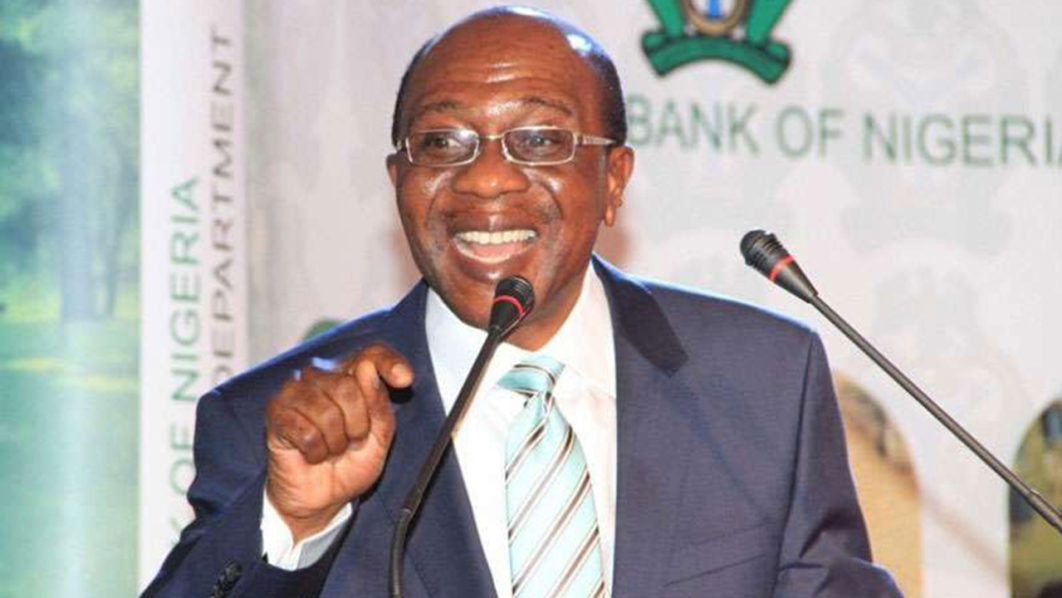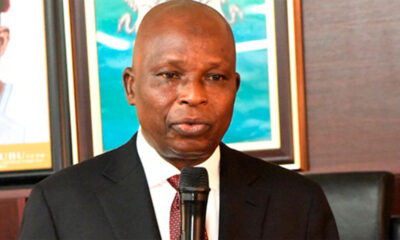Business
Emefiele: Our decision on cryptocurrency in Nigeria’s interest

- ICPC, SEC back CBN
Central Bank of Nigeria, Mr Godwin Emefiele, has defended the apex bank’s ordering of banks, non-banking and other financial institutions not to facilitate trading and dealings in cryptocurrencies is in the nation’s best interest.
He stated this while briefing a joint Senate Committee on Banking, Insurance and Other Financial Institutions, ICT and Cybercrimes, and Capital Market, on its directive banning cryptocurrency trading.
He said the operations of cryptocurrencies were dangerous and opaque.
The Independent Corrupt Practices and Other Related Offences Commission (ICPC) and the Nigerian Financial Intelligent Unit (NFIU), which also addressed the joint committee, said cryptocurrency was being used as a channel for funding violence and terrorism in Nigeria.
Emefiele said the use of cryptocurrency contravened the law, adding that the fact that cryptocurrencies are issued by unregulated and unlicensed entities, made it contrary to the mandate of the CBN, as enshrined in the CBN Act (2007) that empowers it as the issuer of legal tender in Nigeria.
Emefiele also differentiated between digital currencies, which apex banks can issue, and cryptocurrencies issued by unknown and unregulated entities.
He said that the anonymity, obscurity and concealment of cryptocurrencies made them suitable for those indulging in illegal activities such as money laundering, terrorism financing, purchase of small arms and light weapons and tax evasion.
Citing instances of investigated criminal activities that had been linked to cryptocurrencies, he stated that the legitimacy of money and the safety of Nigeria’s financial system were central to the mandate of the CBN.
“Cryptocurrency is not legitimate money because it is not created or backed by any central bank.
“Cryptocurrency has no place in our monetary system at this time and cryptocurrency transactions should not be carried out through the Nigerian banking system,” he said.
Emefiele faulted arguments that the CBN’s actions were inimical to the development of FinTech or a technology-driven payment system.
He stated that the Nigerian payment system, boosted by reforms driven by the CBN had evolved over the past decade, surpassing those of many of its counterparts in emerging frontier and advanced economies.
While urging that the issue of cryptocurrency be treated with caution, the CBN governor assured the committee that the bank would continue its surveillance and deeper understanding of the digital space.
He stated that the ultimate goal of the CBN was to do all within its regulatory powers to educate Nigerians on emerging financial risks and protect the financial system from the activities of currency speculators, money launderers, and international fraudsters.
Director-General of the Securities and Exchange Commission (SEC), Mr Lamido Yuguda, said there was no policy contradiction between the CBN directive and the pronouncements by the SEC on cryptocurrencies dealings in Nigeria.
He said the SEC made its pronouncement at the time to provide regulatory certainty within the digital asset space due to the growing volume of reported flaws.
He added that the CBN, Nigeria Deposit Insurance Corporation (NDIC) and the SEC between 2018 and 2020 had warned on the lack of protection in investments in cryptocurrency.
Yuguda said following the CBN directive, the SEC had suspended the admittance of all persons affected by CBN circular into its proposed regulatory incubatory framework in order to ensure that only operators in full compliance with extant laws and regulations were admitted into the framework for regulating digital assets.
Chairman of the ICPC, Prof. Bolaji Owasanoye (SAN), spoke on the risks of investing in virtual assets and cryptocurrencies in Nigeria.
He said cryptocurrencies posed serious legal and law enforcement risks for Nigeria due to its opaque nature and illicit financial flows.
He added that the current move by the Federal Government to link National Identification Numbers with SIM cards attested to the fact that terrorists, kidnappers, bandits and perpetrators in illegal acts had relied on the shield provided by anonymity to commit crimes.
Business
PH refinery to blend 1.4-million litre petrol daily – NNPC

PH refinery to blend 1.4-million litre petrol daily – NNPC
Rehabilitated old Port Harcourt refinery is currently operating at 70 per cent of its installed capacity, the Nigerian National Petroleum Company Limited has said.
The Port Harcourt Refining Company (PHRC) operates two refineries: the old refinery with a capacity of 60,000 barrels per stream day (bpsd) and a new refinery with an installed capacity of 150,000 bpsd.
The NNPCL in a statement on Tuesday, said it planned to increase the operation to 90 per cent of the refinery’s capacity.
“The Board and Management of the Nigerian National Petroleum Company Limited (NNPC Ltd) express heartfelt appreciation to Nigerians for their support and excitement over the safe and successful restart of the 60,000 barrels-per-day Old Port Harcourt Refinery,” the statement reads.
“This achievement marks a significant step forward after years of operational challenges and underperformance.
“We are, however, aware of unfounded claims by certain individuals suggesting that the refinery is not producing products. For clarity, the Old Port Harcourt Refinery is currently operating at 70% of its installed capacity, with plans to ramp up to 90%.”
According to NNPC, the refinery has commenced production of daily outputs of straight-run petrol (naphtha), which is blended into 1.4 million litres of petrol.
The national oil company said the refinery has also started producing 900,000 litres of kerosene per day and 1.5 million litres per day of diesel.
The NNPC said 2.1 million litres daily volume of low-pour fuel oil (LPFO) would also be produced at the refinery, adding that additional volumes of liquefied petroleum gas (LPG) will be refined at the plant.
“It is worth noting that the refinery incorporates crack C5, a blending component from our sister company, Indorama Petrochemicals (formerly Eleme Petrochemicals), to produce gasoline that meets required specifications,” NNPC said.
“Blending is a standard practice in refineries globally, as no single unit can produce gasoline that fully complies with any country’s standards without such processes.”
Additionally, the NNPC said it has made substantial progress on the new Port Harcourt refinery, “which will begin operations soon without prior announcements”.
“We urge Nigerians to focus on the remarkable achievements being realized under the able and progressive leadership of President Bola Tinubu and to support efforts aimed at delivering more dividends to the nation,” the energy firm said.
According to the statement, malicious attacks on “clear progress” only undermine the “significant strides made by NNPC Ltd and the country”.
Business
PH refinery: 200 trucks will load petroleum products daily, says Presidency

PH refinery: 200 trucks will load petroleum products daily, says Presidency
No fewer than 200 trucks are set to load petroleum products at the government-owned Port Harcourt Refinery, the presidency has said.
A presidential spokesperson, Sunday Dare, made this known in a statement through his official X handle on Tuesday.
Newstrends had reported that the Nigerian National Petroleum Company on Tuesday announced that Port Harcourt Refinery has resumed operations and crude oil processing after years of inactivity.
READ ALSO:
- US-based Nigerians get 30-year sentence over $3.5m romance scam
- 4 Nigerians arrested in Libya for alleged drug trafficking, infection charges
- BREAKING: Port Harcourt refinery begins operation
Reacting, Dare said, “200 trucks are expected to load products daily from the refinery, Renewing the Hopes of Nigeria.”
He added that “the Port Harcourt refinery has two wings.
“The Old Refinery comes on stream today with an installed production capacity of 60, 000 barrels per day of crude oil.”
PH refinery: 200 trucks will load petroleum products daily, says Presidency
Business
Breaking: CBN increases interest rate to 27.50%

Breaking: CBN increases interest rate to 27.50%
The Central Bank of Nigeria (CBN) has raised the lending interest to 27.50 per cent from 27.25 per cent.
This latest increase in the Monetary Policy Rate came after a meeting of the Monetary Policy Committee (MPC) of the Central Bank of Nigeria (CBN) on Monday and concluded Tuesday.
The Monetary Policy Rate measures the benchmark interest rate.
The CBN Governor, Yemi Cardoso, announced this in Abuja on Tuesday after the MPC meeting, last for the year, held at the apex bank’s headquarters.
He said the MPC voted unanimously to raise the MPR by 25 basis points from 27.25% to 27.50%; and retain the Cash Reserve Ratio (CRR) at 50% for Deposit Money Banks and 16% for Merchant Banks.
The CBN governor also said the MPC retained the Liquidity Ratio (LR) at 30% and Asymmetric Corridor at +500/-100 basis points around the MPR.
-

 metro23 hours ago
metro23 hours agoBREAKING: Port Harcourt refinery begins operation
-

 Business3 days ago
Business3 days agoJust in: Dangote refinery reduces petrol price for marketers
-

 metro2 days ago
metro2 days ago40-foot container falls on car in Lagos
-

 Politics3 days ago
Politics3 days ago2027: Lagos Speaker, Obasa joins gov race, may battle Seyi Tinubu, others
-

 Politics2 days ago
Politics2 days agoLagos 2027: Seyi Tinubu campaign team releases his life documentary
-

 International2 days ago
International2 days agoTrump to sack 15,000 transgender officers from U.S. military: Report
-

 Entertainment2 days ago
Entertainment2 days agoPolygamy best form of marriage for Africa – Okey Bakassi
-

 Education15 hours ago
Education15 hours agoUS University opens 2025 scholarships for international students















You must be logged in to post a comment Login